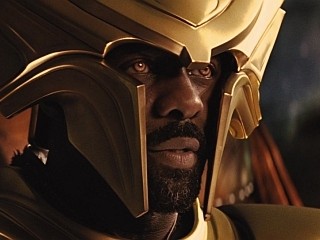Thoughts on Race, Biblical Epics, and Early Jewish History

Idris Elba as the Whitest of the Norse gods
One of many hypocrisies indulged in by organized Jewry and the growing legion of White ethno-masochistic Social Justice Warriors (SJWs) concerns the racial element in motion picture casting. A fairly recent example has been the months of criticism preceding the release of Ridley Scott’s Exodus: Gods and Kings, with most critiques revolving around the theme that the movie is unfaithful to historical racial profiles. Without getting into the debate over which ethnicity built the pyramids, there are probably more than a few aesthetic incongruities in the casting of Moses (if he actually existed) and Ramses II. Welsh-born Christian Bale, cast as Moses, doesn’t look even faintly Semitic. Nor does Joel Edgerton resemble in any way a North African, or Middle Easterner of any description. The rest of the major roles are populated by Anglo-Saxon actors like Sigourney Weaver and Aaron Paul.
Much to the annoyance of hand-wringing liberal commentators, Black actors feature mainly in the movie as slaves. The Sydney Morning Herald even notedthat infuriated SJWs had taken to Twitter in droves to protest at the set, “particularly the nose on the Great Sphinx of Giza, saying it gives the statue a European profile.” Because of these and other creative decisions, criticism had been brewing since the cast was first announced, eventually forcing Scott to address his choices in an interview with Yahoo! Australia:
Egypt was—as it is now—a confluence of cultures, as a result of being a crossroads geographically between Africa, the Middle East, and Europe. We cast major actors from different ethnicities to reflect this diversity of culture, from Iranians to Spaniards to Arabs. There are many different theories about the ethnicity of the Egyptian people, and we had a lot of discussions about how to best represent the culture.
While I view the ethnicity of the ancient Egyptians as being of token importance in the modern age and of little value in contemporary debates about race, I do take issue with critiques of the casting of Black actors as slaves. Giving the Exodus tale even some benefit of the doubt, and assuming that there was in fact a clash between the leadership of a proto-Jewish population and the Egyptians during the New Kingdom (c.1560–1070 B.C.), a careful look at the historical record suggests that Black slaves (coming mostly from Nubia) were a common feature of the Egyptian landscape. Indeed, the era of Ramses II has been described as the
. . .most flourishing period of Egyptian slavery. The imperial Egyptian state controlled large parts of what now constitutes Israel, the Sinai, Syria, and the northern Sudan. … Nubia was forced to contribute slaves, and entire lists of captured Nubians from this period have been found. Although certain numbers given in the inscriptions are exceedingly high and might be exaggerations, it is obvious that tens of thousands of slaves were imported to Egypt during the great wars of expansion.[1]
http://www.theoccidentalobserver.net/2015/01/thoughts-on-race-biblical-epics-and-early-jewish-history/#more-26050



